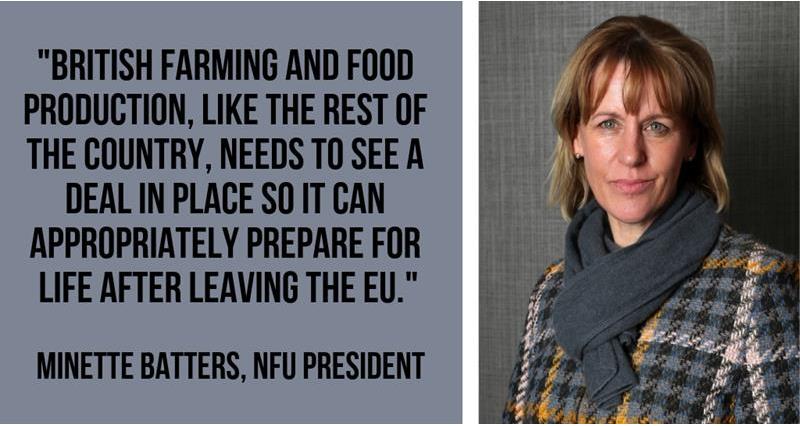“Last night’s vote has done little to provide much-needed certainty for the future of food and farming in Britain, and time is running out.
“With less than two months to go until we leave the EU, we are hugely concerned that a no-deal Brexit is becoming increasingly likely. The NFU has been absolutely clear that this would be catastrophic for food production in Britain.
“Leaving the EU without a deal could well mean a trade embargo is imposed on animals and animal products going to the EU which, along with punitive tariffs on all goods going into the EU, would severely restrict livestock farmers’ export markets.
"Meanwhile, the potential for government to unilaterally lower import tariffs on food could lead to British farmers being undercut by food coming into the country which may have been produced to lower standards than is legally required of UK farmers.
“Although it is encouraging that the majority of MPs opposed a no-deal scenario in the votes last night, no-deal cannot simply be wished away. An agreement negotiated between the EU and UK, and accepted by Parliament, must be reached urgently to protect the country’s ability to produce its own food and feed its people.
“The NFU will be assessing any deal against our six key principles agreed at an extraordinary meeting of the NFU’s Council in December, which includes avoiding a no-deal and ensuring free and frictionless trade with our biggest trading partner.
“We are getting to crunch point now. British farming and food production, like the rest of the country, needs to see a deal in place so it can appropriately prepare for life after leaving the EU.”
Potential impacts of a ‘no-deal’ Brexit on the British food and farming industry
- EU legislation could effectively result in a trade embargo on the export of UK animal-based products such as meat, eggs and dairy to the EU. These products can only be imported by the EU from approved countries, and it could take months for such status to be granted to the UK. The lamb industry would be particularly impacted. In 2017, 31% of domestic sheep meat production, the equivalent of 4.5million sheep, was exported and 94% was destined for the EU.
- Export tariffs could be imposed on the 60% of UK food, feed and drink that go to the EU, increasing export tariffs to an average of 27% on chicken, 46% on lamb, 65% on beef, and range from €172 to €1,494 per tonne in pork.
- It is likely that trade barriers will go up between the UK and EU which could limit the availability of many farm inputs such as veterinary medicines, fertilisers, plant protection products, machinery parts and animal feed. Furthermore, as the EU will no longer recognise UK organic certification bodies, exports of organic products to the EU could be severely curtailed.
- The sudden end of labour mobility from the EU could cause serious problems when it comes to securing the necessary labour to harvest and process UK produce, as well as in related roles such as carrying out veterinary inspections.
'A no deal would be absolutely savage for us, I cannot imagine how bad it will look' - National Farmers' Union president @Minette_Batters says she has had no written assurances from the government over their plans post-Brexit.
— Ridge on Sunday (@RidgeOnSunday) February 3, 2019
#Ridge
For more, head here: https://t.co/y0ZoN9dk4C pic.twitter.com/VoLFOT5zQw
Above: NFU President Minette Batters appeared live on the Sky News Sophy Ridge on Sunday programme yesterday talking about how a no-deal Brexit would impact farming. Minette said it would be catastrophic for the industry and that she has had no written assurances from the government over their plans post-Brexit.
Read more:
- NFU's six principles to deliver best Brexit outcome for British farmers and growers
- Brexit should be 'orderly and incremental'
- Certainty needed for farmers as mid-term confidence hits all-time low
More NFU work for members in regards to exiting the EU:
